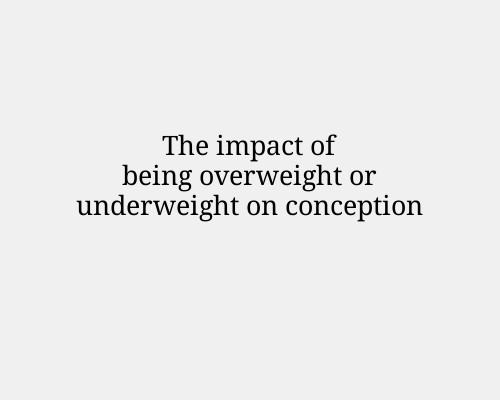
Being either overweight or underweight can significantly affect fertility and the ability to conceive. Maintaining a healthy weight is crucial for optimal reproductive health, as both extremes of body weight can disrupt hormonal balance, ovulation, and overall reproductive function. Here's a breakdown of how being overweight or underweight impacts conception:
Impact of Being Overweight on Conception
Excess body fat can interfere with a woman's fertility in several ways:
Hormonal Imbalances: One of the primary ways being overweight impacts fertility is through hormone regulation. Increased fat tissue can lead to higher levels of oestrogen, which may disrupt the normal functioning of the menstrual cycle. This can cause irregular ovulation or even anovulation (the absence of ovulation), making it difficult to conceive.
Insulin Resistance: Overweight individuals are at higher risk of developing insulin resistance, which can lead to polycystic ovary syndrome (PCOS). PCOS is one of the most common causes of infertility, as it disrupts the ovaries' ability to release eggs.
Reduced Egg Quality: Excess weight may affect egg quality, lowering the chances of conception and increasing the risk of miscarriage. Obesity can also impair the function of the ovaries, which are responsible for producing eggs, thus lowering fertility.
Increased Risk of Miscarriage: Being overweight or obese is associated with an increased risk of miscarriage. Studies have shown that overweight women have a higher chance of pregnancy loss, possibly due to poor egg quality and hormonal imbalances.
Complications During Pregnancy: Even if conception occurs, being overweight increases the risk of complications during pregnancy, such as gestational diabetes, hypertension, and preeclampsia. These factors can further reduce the likelihood of a successful pregnancy.
Managing Weight for Fertility
Maintaining a healthy weight is critical for improving fertility. For women who are overweight, losing even a small amount of weight (5-10% of body weight) can help restore hormonal balance and improve ovulation. A combination of a balanced diet, regular exercise, and, when necessary, medical interventions, can support fertility efforts.
Impact of Being Underweight on Conception
Being underweight, typically defined as having a body mass index (BMI) of less than 18.5, can also hinder fertility:
Disrupted Ovulation: Low body weight often leads to irregular menstrual cycles or the complete cessation of menstruation (amenorrhea). Ovulation is closely tied to body fat percentage, and when it is too low, it can prevent the ovaries from releasing eggs, making conception nearly impossible.
Hormonal Imbalance: Insufficient body fat can cause the body to produce inadequate levels of oestrogen, which is essential for normal reproductive function. Low oestrogen levels can result in poor egg development and diminished fertility.
Nutrient Deficiencies: Being underweight often means a lack of proper nutrition, which can negatively impact reproductive health. Deficiencies in key nutrients like folic acid, iron, and vitamin D can contribute to infertility and other health issues that may affect pregnancy.
Lower Pregnancy Success Rates: Women who are underweight may experience difficulty carrying a pregnancy to term. The lower body fat and nutritional deficiencies can interfere with the development of a healthy pregnancy, increasing the risk of complications such as preterm birth, low birth weight, or failure to thrive.
Higher Risk of Early Miscarriage: Women who are significantly underweight are at a higher risk of early miscarriage. This is often due to hormonal disturbances and insufficient energy stores needed to support a developing pregnancy.
Improving Fertility with Weight Gain
For women who are underweight, gaining weight gradually through a nutrient-dense diet can help restore regular ovulation and improve fertility. A balanced approach that includes healthy fats, lean proteins, and complex carbohydrates is essential to promote a healthy body composition and enhance reproductive health.
The Role of Body Fat in Male Fertility
While the focus is often on female fertility when discussing weight, male fertility can also be affected by body weight:
Overweight and Male Fertility: Obesity in men has been linked to reduced sperm count, poor sperm motility, and abnormal sperm morphology. High body fat can increase oestrogen levels in men and reduce testosterone levels, which are crucial for sperm production. Men who are overweight may also experience erectile dysfunction, further complicating conception efforts.
Underweight and Male Fertility: Low body weight in men can lead to reduced testosterone levels, decreased sperm production, and lower sperm quality. Like women, men who are underweight may also experience hormonal imbalances that affect reproductive health.
Achieving a Healthy Weight for Fertility
Achieving a healthy weight, whether that means losing weight or gaining it, is essential for improving fertility and increasing the chances of conception. Here are some general guidelines:
Balanced Diet: Both overweight and underweight individuals should focus on a well-balanced, nutrient-dense diet. This includes plenty of fruits, vegetables, whole grains, lean proteins, and healthy fats. For women, folate and iron are especially important for reproductive health.
Regular Exercise: Regular physical activity is essential for maintaining a healthy weight. However, extreme exercise or excessive caloric restriction can disrupt hormonal balance, especially for underweight individuals. Moderate, consistent exercise is the key.
Consult a Healthcare Provider: For individuals struggling with weight-related fertility issues, consulting a healthcare provider or fertility specialist is recommended. They can assess hormone levels, nutritional needs, and overall health to develop a personalized plan for improving fertility.
Conclusion
Both being overweight and underweight can have detrimental effects on fertility. While obesity can lead to hormonal imbalances, insulin resistance, and poor egg quality, being underweight can disrupt ovulation and hormone production. Achieving and maintaining a healthy weight through a balanced diet, exercise, and professional guidance is crucial for enhancing fertility and increasing the chances of successful conception. By addressing weight-related concerns, couples can improve their reproductive health and boost their likelihood of achieving a healthy pregnancy.